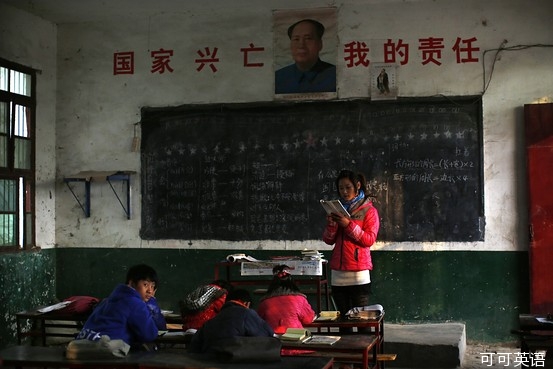
For much of the last year, intellectuals and officials in China -- land of world-beating students and, in a bygone age, the scholar official -- have been wringing their hands over the country's declining interest in reading.
去年大部分時(shí)間,中國的知識(shí)分子和官員一直對(duì)中國人閱讀興趣下降感到痛心。而事實(shí)上,中國學(xué)生的成績(jī)處于世界一流水平,而且過去多年培養(yǎng)了很多學(xué)者型官員。
Earlier this week, the anxiety surfaced in the highest of forums: the annual government work report. Delivering the report in Beijing's Great Hall of the People on Wednesday, Chinese Premier Li Keqiang said that, in addition to improving government housing and reforming management of outbound investment, the government would also 'encourage the people to read.'
本周早些時(shí)候,閱讀問題出現(xiàn)在年度政府工作報(bào)告這一最高級(jí)別的領(lǐng)導(dǎo)講話中。中國國務(wù)院總理李克強(qiáng)周三在北京人民大會(huì)堂發(fā)表政府工作報(bào)告時(shí),除提出改善居民住房條件、改革對(duì)外投資管理以外,還表示政府將倡導(dǎo)全民閱讀。
It was the first time a Chinese premier had mentioned reading in his work report, and followed months of panicked stories in the Chinese media about the country's antipathy for the written word, including a special pagedevoted to the subject on the Sina news portal under the headline 'Why Don't We Love to Read Anymore?' In a country with a storied literary tradition where people are already writing less, at least with pen and paper, it's hardly surprising that a fall in reading would generate angst.
這是中國總理首次在政府工作報(bào)告中提及閱讀。此前幾個(gè)月中國媒體對(duì)于國內(nèi)不喜文字閱讀的惶恐報(bào)道比比皆是,其中門戶網(wǎng)站新浪網(wǎng)(Sina)還就此特別制作了名為“我們?yōu)槭裁床粣坶喿x了”的專題頁面。中國是有著深厚文學(xué)傳統(tǒng)的國家,但現(xiàn)在人們寫得越來越少(至少用紙筆書寫越來越少),閱讀量下降引發(fā)擔(dān)憂并不讓人意外。
It's not clear, however, that Chinese people actually are reading less.
不過,還不清楚中國人是不是真的讀書越來越少。
The source of a much of the anxiety is a study attributed to the United Nation's Education, Scientific and Cultural Organization (UNESCO) that found Chinese people read only 4.39 books per year on average, compared with 11 in South Korea, 8.4 in Japan, seven in the U.S. and 64 among 'Jews.' The study's results began to spread through Chinese media roughly six months ago, repeated even by the official Xinhua news agency, which said on the basis of the study that Chinese read less than one book a year outside of text books.
這種焦慮主要來自于據(jù)稱是聯(lián)合國(United Nation)教科文組織(Education, Scientific and Cultural Organization)的一項(xiàng)調(diào)查。調(diào)查發(fā)現(xiàn),中國人均每年讀書4.39本,相比之下,韓國為11本,日本為8.4本,美國為7本,而猶太人為64本。大概六個(gè)月前,這一調(diào)查結(jié)果開始在中國媒體上傳播,甚至被官方媒體新華社所引用。新華社稱,根據(jù)這一調(diào)查結(jié)果計(jì)算,扣除教科書之外中國一年人均讀書還不到一本。
The problem: According to the education department in UNESCO's Beijing office, the study doesn't exist.
但問題在于,據(jù)聯(lián)合國教科文組織北京辦事處的教育部門稱,上述調(diào)查根本不存在。
So how do Chinese people compare to the rest of the world when it comes to reading? Unfortunately, there have been few reliable studies of global reading habits in recent years. But one measure based on surveys of the 30,000 people in 30 countries done in 2005, the NOP World Culture Score Index, found Chinese people over the age of 13 devoted an average of eight hours a week to the pursuit, third behind only India (10.7 hours) and Thailand (9.4 hours). (The U.S., at 5 hours and 42 minutes, was No. 22.)
那么如何比較中國人和世界其他地區(qū)人民的閱讀量呢?遺憾的是,近年來幾乎沒有什么可靠的全球閱讀習(xí)慣調(diào)查。但NOP世界文化評(píng)分指數(shù)(NOP World Culture Score Index)在2005年對(duì)30個(gè)國家的3萬人進(jìn)行了調(diào)查,結(jié)果發(fā)現(xiàn),13歲以上的中國人每周平均讀書時(shí)間為8小時(shí),僅次于印度(10.7小時(shí))和泰國(9.4小時(shí)),美國為5小時(shí)42分鐘,排在第22位。
A national Chinese survey, meanwhile, found that frequent readers made up 55% of adults between 18 and 70 years old in 2012, an increase of 1% over the previous year. According to yet another survey by OpenBook, a research company, more than 70% of readers increased spending on books in 2012, especially from internet.
與此同時(shí),中國國內(nèi)的一項(xiàng)調(diào)查發(fā)現(xiàn),2012年,18-70歲的成年人中有55%的人經(jīng)常讀書,這一比例較前一年上升1個(gè)百分點(diǎn)。研究公司開卷(OpenBook)的另一項(xiàng)調(diào)查發(fā)現(xiàn),2012年超過70%的讀者增加了購書支出,尤其是網(wǎng)上購書。
Those numbers are much more in keeping with a country where nearly every student is taught the words of Song Dynasty scholar Liu Yi: 'Reading thousands of books is the same as traveling thousands of miles.'
宋朝的劉彝曾寫到“讀萬卷書,行萬里路”,在幾乎每個(gè)學(xué)生都知道這一箴言的中國,上面的調(diào)查結(jié)果要更符合國情。
Not that we think Mr. Li wrong to encourage Chinese people to pick up a book -- or e-reader -- more often. As one of his predecessors, celebrated former premier Zhou Enlai, once noted, 'reading books will help China rise.'
我們并不是認(rèn)為李克強(qiáng)鼓勵(lì)中國人增加閱讀量有錯(cuò)。頗有名望的中國前總理周恩來就曾說過:“為中華之崛起而讀書。”


